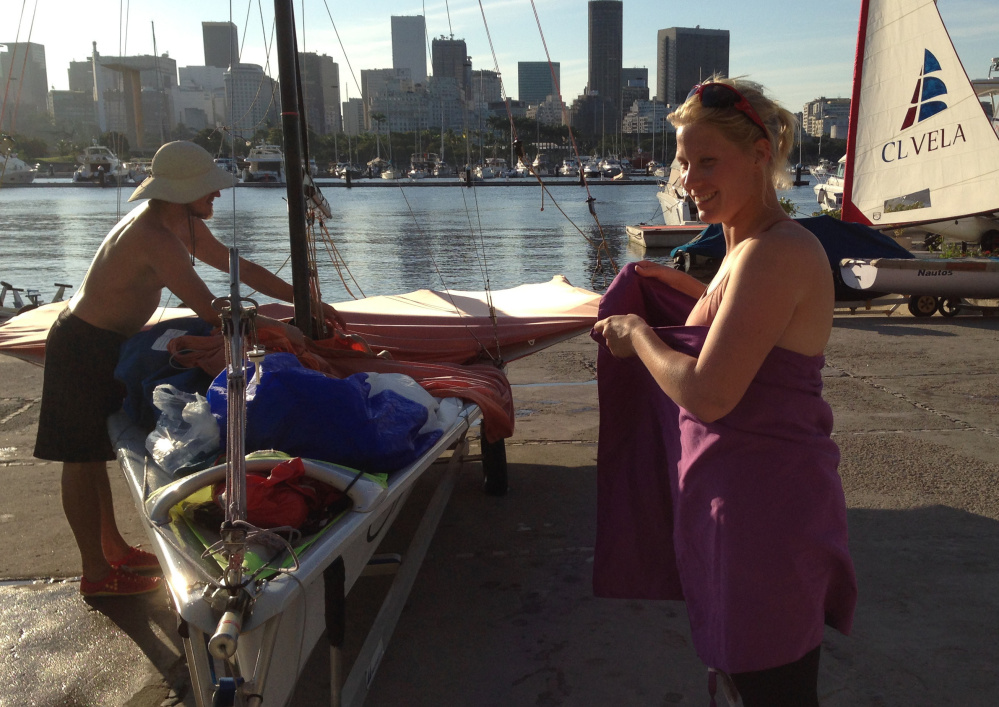RIO DE JANEIRO — A new pollution problem has surfaced in Guanabara Bay, the venue for sailing in the Rio de Janeiro Olympics.
Sailors complained Monday about an oil slick that turned white boats brown with crews in town practicing for the Olympics, which open in a month.
“We’ve never seen anything like this. It was all over the place,” said Finnish sailor Camilla Cedercreutz. “There was no way you could avoid it.”
It’s yet another in a long list of problems confronting South America’s first games: the Zika virus, rising crime and violence, budget cuts and slow ticket sales.
The games will also open with Brazilian President Dilma Rousseff facing an impeachment trial, and Brazil mired in its deepest recession in decades.
Cedercreutz said the slick filled part of the bay on Sunday, staining her boat from bow to stern.
“This is only our second time in Rio,” said Cedercreutz, who has qualified in the 49erFX class. “We’ve heard it was really bad. You get mad because it shouldn’t be like this anywhere. It shouldn’t be this dirty. But there’s nothing we can do about it.”
Cedercreutz’s sailing partner, Noora Ruskola, said other sailors told her: “Your boat looks like a toilet.”
Guanabara Bay is severely polluted, filled with bacteria and viruses.
However, sailors have less frequently complained about industrial pollution in the giant bay.
Spanish sailor Jordi Xammar, who will compete in the 470 class, said he saw the slick “and tried to avoid it.”
“The boats were completely brown,” he said. “But the worst thing was we saw a lot of dead fish.”
Xammar said this is his fourth time in Rio, and he’s seen the water “improve a bit. It was yellow-green last year.”
Rio organizing committee officials say the venue is safe, although independent studies by The Associated Press show high level of pathogens in waters that Rio is using for sailing, rowing, canoeing and open-water swimming.
CYCLING: The International Cycling Union says Tatyana Antoshina, a road racer on Russia’s national squad prior to the Rio Olympics, has been provisionally suspended after failing a drug test.
The UCI says Antoshina tested positive for GHRP-2, a drug that stimulates the body’s production of growth hormone, in a test taken May 31.
Antoshina races for the Astana team and has won multiple Russian national titles in road racing and time trial events, including a national time trial title last month.
Listed on the Russian national team, she was considered the likely reserve for two-time Olympic medalist Olga Zabelinskaya in the road racing events.
Antoshina finished 12th in the time trial and 25th in the road race at the 2012 Olympics.
KENYA: Police investigating doping searched the hotel rooms of two Italian athlete managers during the Kenyan Olympic trials, and questioned the two men at police headquarters on Monday, one of the managers told The Associated Press.
The agents, Federico Rosa and his father, Gabriele, represent a number of top Kenyan athletes and previously represented marathon champion Rita Jeptoo, one of the highest-profile Kenyans to be banned for doping.
The police “never found anything” when they searched their hotel rooms on Friday in Eldoret, where the trials were held, Federico Rosa said in a phone interview. He said he and his father were never under arrest, and they were unsure what the investigation was about.
Rosa said they had been asked to remain in Kenya and would be told on Tuesday if they were needed for more questioning.
TRACK AND FIELD: The Court of Arbitration for Sport announced it will expedite hearings for 68 Russian athletes seeking to overturn their Olympic bans.
CAS said it will issue its decision no later than July 21, about two weeks before the 2016 Summer Games are scheduled to begin in Rio de Janeiro.
The IAAF, which governs track worldwide, banned the entire Russian track team last year after a World Anti-Doping Agency report presented evidence of systemic cheating among athletes, coaches and officials.
The Russian Olympic Committee filed its appeal with CAS after the ban was upheld in June.
Some of the country’s track athletes are pursing another path to Rio, applying for an IAAF exception that allows individuals to compete as “neutrals” if they have aided in the anti-doping effort or can prove they have not used performance-enhancing drugs in the past.
Runner Yulia Stepanova, who was banned for doping but later provided evidence to authorities, was cleared to compete by the IAAF last week.
WRESTLING: Azerbaijan has said it plans to appeal to the Court of Arbitration for Sport after being stripped of two Olympic weightlifting spots over doping.
Send questions/comments to the editors.



Success. Please wait for the page to reload. If the page does not reload within 5 seconds, please refresh the page.
Enter your email and password to access comments.
Hi, to comment on stories you must . This profile is in addition to your subscription and website login.
Already have a commenting profile? .
Invalid username/password.
Please check your email to confirm and complete your registration.
Only subscribers are eligible to post comments. Please subscribe or login first for digital access. Here’s why.
Use the form below to reset your password. When you've submitted your account email, we will send an email with a reset code.